<< Previous | Displaying results 4431-4440 of 6776 for "" | Next >>
Germany launched its western offensive on May 10, 1940. German paratroopers landed in the Netherlands on the first day of the German attack on that country. They seized key bridges and fortifications, compromising Dutch defensive positions. This footage shows the German air force (Luftwaffe) dropping paratroopers near Rotterdam. Within days, the Netherlands was defeated. The country surrendered to Germany on May 14. The Dutch government and Queen Wilhelmina fled to exile in Great Britain.
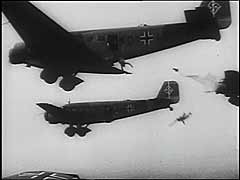
German forces invaded western Europe in May 1940. As part of their strategy to defeat Britain and France, German forces invaded neutral Belgium. Little more than two weeks after the German invasion of Belgium, King Leopold III ordered the surrender of the Belgian army. In this footage a Belgian officer signs the surrender and thousands of refugees flood the streets as German forces move through Belgium.
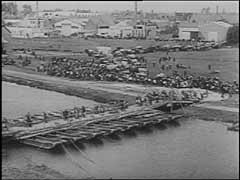
Germany invaded France in May 1940. This footage shows German tanks, artillery, and divebombers attacking the Maginot Line, a series of French fortifications intended to protect France's border with Germany. The main German assault, however, went to the north through Luxembourg and bypassed the Maginot Line. German forces entered Paris on June 14, 1940. Little more than a week later, defeated France signed an armistice with Germany.
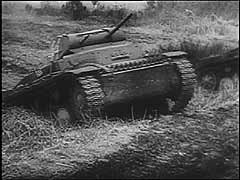
The German western campaign in May 1940 decisively defeated the British and French forces arrayed against it. By the end of May, the Allies began the withdrawal of British and French forces from the Continent to prevent their surrender or destruction. The evacuation effort centered on the French coastal town of Dunkirk. As German forces completed their conquest of France, more than 1,000 vessels--including small civilian yachts and fishing boats--ferried Allied forces across the English Channel to Great…
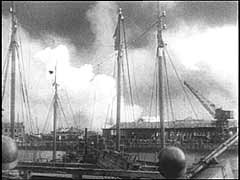
After the defeat of France in June 1940, Germany moved to gain air superiority over Great Britain as a prelude to an invasion of Britain. Despite months of air attacks, Germany was not able to destroy Britain's Royal Air Force (RAF). In the fall of 1940, the invasion was indefinitely postponed. The German bombing campaign against Britain continued until May 1941. The Germans ultimately halted the air attacks primarily because of preparations for the invasion of the Soviet Union in June 1941.
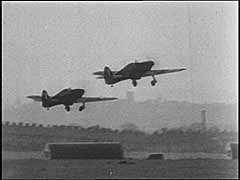
After the defeat of France in June 1940, Germany moved to gain air superiority over Great Britain as a prelude to an invasion of Britain. During almost nightly German air raids (known as "the Blitz") on London, the civilian population of the city sought refuge--as shown in this footage--in air raid shelters and in London's subway system (called the "Underground" or the "Tube"). Despite months of air attacks, Germany was not able to destroy Britain's Royal Air Force (RAF). In the fall of 1940, the invasion…
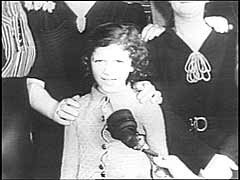
Adolf Hitler became chancellor of Germany in January 1933. Soon thereafter, terror actions against opponents of Nazism began: Jews were a major target in these campaigns. Many Jews were subjected to public humiliation or arrest, and others were forced to quit their posts. Anti-Jewish measures climaxed with the April 1, 1933, boycott of Jewish-owned businesses. This footage depicts a Jewish anti-Nazi march in Chicago.
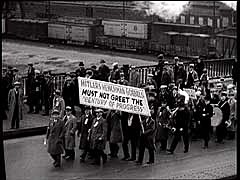
The American Jewish Congress was among the first groups in the United States to oppose Nazism. It held a mass rally as early as March 1933, soon after Hitler rose to power in Germany, and continued to hold rallies throughout the war years. The American Jewish Congress organized this anti-Nazi march through Lower Manhattan. The event coincided with book burning in Germany.
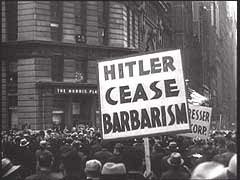
On November 9, 1938, the Nazis led a nationwide pogrom against Jews. During the pogrom, known as "Kristallnacht" (the "Night of Broken Glass"), bands of Storm Troopers (SA) destroyed thousands of Jewish-owned businesses and hundreds of synagogues. Almost 100 Jews were killed in the process. This footage shows scenes from a protest rally in New York City. Rabbi Stephen S. Wise voiced the outrage of the American Jewish community. As part of an official protest by the United States government against the…
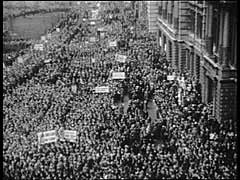
Although constrained by powerful isolationist sentiment in the United States, President Roosevelt was determined to help democratic Great Britain continue the war against Nazi Germany. Even as he promised to keep the United States neutral in the European war, Roosevelt ordered the expansion of military construction and pledged--as shown in this footage--that the United States would serve as the "great arsenal of democracy." In March 1941, Congress approved Lend-Lease aid for Britain. Britain ultimately…
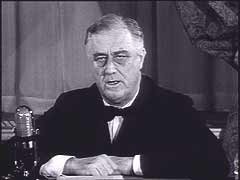
We would like to thank Crown Family Philanthropies, Abe and Ida Cooper Foundation, the Claims Conference, EVZ, and BMF for supporting the ongoing work to create content and resources for the Holocaust Encyclopedia. View the list of donor acknowledgement.